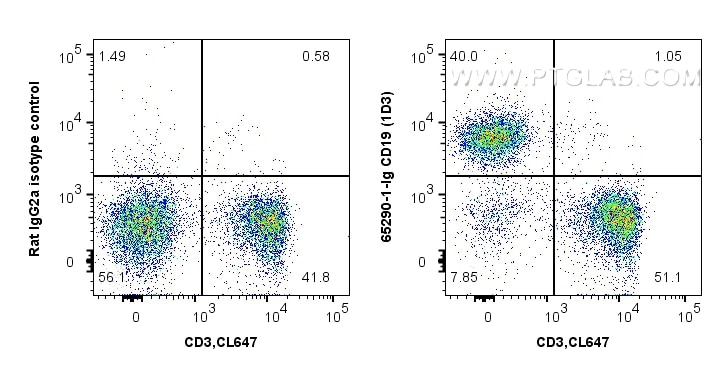CD19 Monoklonaler Antikörper
CD19 Monoklonal Antikörper für FC
Wirt / Isotyp
Ratte / IgG2a
Getestete Reaktivität
Maus
Anwendung
FC
Konjugation
Unkonjugiert
CloneNo.
1D3
Kat-Nr. : 65290-1-Ig
Synonyme
Galerie der Validierungsdaten
Geprüfte Anwendungen
| Erfolgreiche Detektion in FC | Maus-Splenozyten |
Empfohlene Verdünnung
| Anwendung | Verdünnung |
|---|---|
| This reagent has been tested for flow cytometric analysis. It is recommended that this reagent should be titrated in each testing system to obtain optimal results. | |
| Sample-dependent, check data in validation data gallery | |
Produktinformation
65290-1-Ig bindet in FC CD19 und zeigt Reaktivität mit Maus
| Getestete Reaktivität | Maus |
| Wirt / Isotyp | Ratte / IgG2a |
| Klonalität | Monoklonal |
| Typ | Antikörper |
| Immunogen | Mouse CD19 Transfected Cell Line |
| Vollständiger Name | CD19 antigen |
| GenBank-Zugangsnummer | BC156767 |
| Gene symbol | Cd19 |
| Gene ID (NCBI) | 12478 |
| Konjugation | Unkonjugiert |
| Form | Liquid |
| Reinigungsmethode | Affinitätsreinigung |
| Lagerungspuffer | PBS with 0.09% sodium azide. |
| Lagerungsbedingungen | Store at 2-8°C. Stable for one year after shipment. |
Hintergrundinformationen
CD19 is a 95 kDa type I transmembrane glycoprotein belonging to the immunoglobulin superfamily (PMID: 2472450). It is expressed by B cells and follicular dendritic cells. CD19 is up-regulated at the step of B-lineage commitment during the differentiation of the hematopoietic stem cell, it remains on during subsequent stages of differentiation until finally down-regulated during terminal differentiation into plasma cells (PMID: 8528044). CD19 is involved in B cell development, activation and differentiation. It is the dominant component for the signaling complex on B cells that includes CD21 (CR2), CD81 (TAPA-1) and CD225 and acts as a critical co-receptor for BCR signal transduction (PMID: 23210908).
Protokolle
| Produktspezifische Protokolle | |
|---|---|
| FC protocol for CD19 antibody 65290-1-Ig | Protokoll herunterladen |
| Standard-Protokolle | |
|---|---|
| Klicken Sie hier, um unsere Standardprotokolle anzuzeigen |


